-
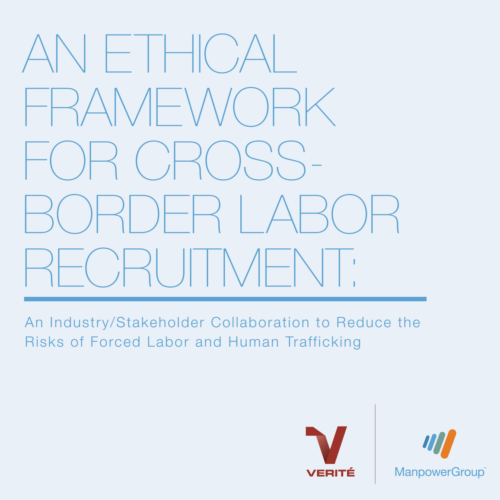 This Framework offers a checklist guide of specific Standards of Ethical Practice for firms involved in cross-border recruitment of workers, and outlines a Verification and Certification System designed to protect workers against specific patterns of vulnerability and abuse. The SEP include: - a checklist of operating rules for firms engaged in the cross-border recruitment and movement of workers The VCS outline includes: - an outline of elements and principles to be adopted by organisations that wish to measure, certify, and ensure compliance of particular enterprises with the SEP The Framework also details a list of recommendations which are informed by ManpowerGroups’s pragmatic experience in responsible cross-border recruitment of workers, and Verite’s expertise in creating verification systems to protect human rights. It is intended as the first phase in a three-phase project, the second phase is a demonstration project with interested groups, the third phase is the development and dissemination of results, assessments, further recommendations and supporting materials for the wider replication and adaptation of the Framework.
This Framework offers a checklist guide of specific Standards of Ethical Practice for firms involved in cross-border recruitment of workers, and outlines a Verification and Certification System designed to protect workers against specific patterns of vulnerability and abuse. The SEP include: - a checklist of operating rules for firms engaged in the cross-border recruitment and movement of workers The VCS outline includes: - an outline of elements and principles to be adopted by organisations that wish to measure, certify, and ensure compliance of particular enterprises with the SEP The Framework also details a list of recommendations which are informed by ManpowerGroups’s pragmatic experience in responsible cross-border recruitment of workers, and Verite’s expertise in creating verification systems to protect human rights. It is intended as the first phase in a three-phase project, the second phase is a demonstration project with interested groups, the third phase is the development and dissemination of results, assessments, further recommendations and supporting materials for the wider replication and adaptation of the Framework. -
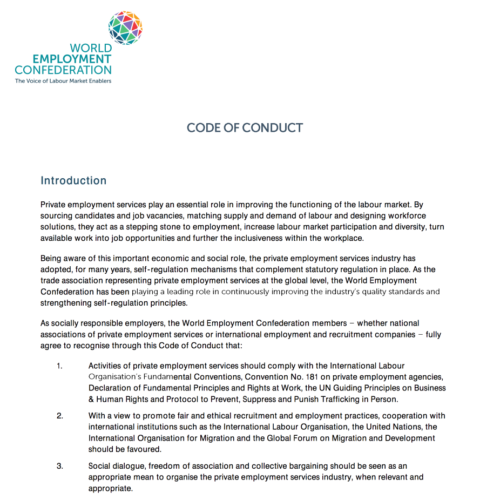 This Code of Conduct was developed by the World Employment Confederation, a trade association representing private employment services at the global level. Its members must agree to its Code of Conduct ensuring fair recruitment and employment practices. The Confederation intends to set out acceptable standards of professional practices to which private employment services are committed and expected to operate. Members are required to adhere to the Code of Conduct and promote its principles towards all relevant stakeholders.
This Code of Conduct was developed by the World Employment Confederation, a trade association representing private employment services at the global level. Its members must agree to its Code of Conduct ensuring fair recruitment and employment practices. The Confederation intends to set out acceptable standards of professional practices to which private employment services are committed and expected to operate. Members are required to adhere to the Code of Conduct and promote its principles towards all relevant stakeholders.Credit: World Employment Confederation
-
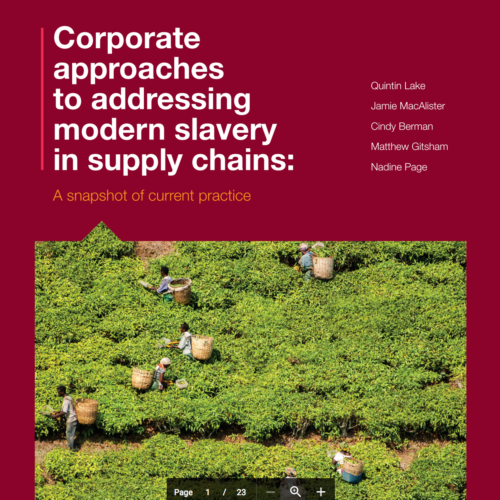 The ETI is an alliance of companies, trade unions and NGOs that promotes workers' rights around the world. This report is the outcome of interviews and surveys with 21 retailers and tier 1 companies across a range of sectors. It is intended to reflect current practice of companies regarding modern slavery and condenses findings into 10 key messages. It is not meant as formal guidance for the industry, but more to provide insight from both ETI and non-ETI members.
The ETI is an alliance of companies, trade unions and NGOs that promotes workers' rights around the world. This report is the outcome of interviews and surveys with 21 retailers and tier 1 companies across a range of sectors. It is intended to reflect current practice of companies regarding modern slavery and condenses findings into 10 key messages. It is not meant as formal guidance for the industry, but more to provide insight from both ETI and non-ETI members.Credit: Ethical Trading Initiative (ETI)
-
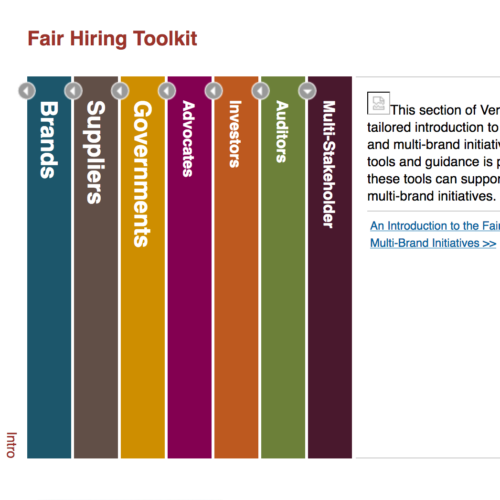 The Fair Hiring Toolkit is a resource which addresses fair hiring practice and responsible recruitment of migrant workers in global supply chains. It focuses on all levels of an organisation to tailor tools and advice appropriately and is a step-by-step process of how to implement trafficking-free supply chains. This includes providing a Framework for Action for brands and suppliers, and supplying guidance for governments, advocates, investors, auditors and other stakeholders. The Frameworks offer advice on: - Improving Codes of Conduct - Raising awareness and building capacity - Strengthening assessments and social audits - Taking corrective action & developing systems improvement plans - Reporting and transparency - Engagement with other actors - Public policy
The Fair Hiring Toolkit is a resource which addresses fair hiring practice and responsible recruitment of migrant workers in global supply chains. It focuses on all levels of an organisation to tailor tools and advice appropriately and is a step-by-step process of how to implement trafficking-free supply chains. This includes providing a Framework for Action for brands and suppliers, and supplying guidance for governments, advocates, investors, auditors and other stakeholders. The Frameworks offer advice on: - Improving Codes of Conduct - Raising awareness and building capacity - Strengthening assessments and social audits - Taking corrective action & developing systems improvement plans - Reporting and transparency - Engagement with other actors - Public policyCredit: Verite
-
 Hedging Risk by Combating Human Trafficking: Insights from the Private Sector is designed to help companies share best practices so they can mitigate their risks and help eliminate this heinous practice. In this first of a series, we highlight insights and technology-driven interventions in the hospitality, finance, and transportation industries.
Hedging Risk by Combating Human Trafficking: Insights from the Private Sector is designed to help companies share best practices so they can mitigate their risks and help eliminate this heinous practice. In this first of a series, we highlight insights and technology-driven interventions in the hospitality, finance, and transportation industries.Credit: World Economic Forum
-
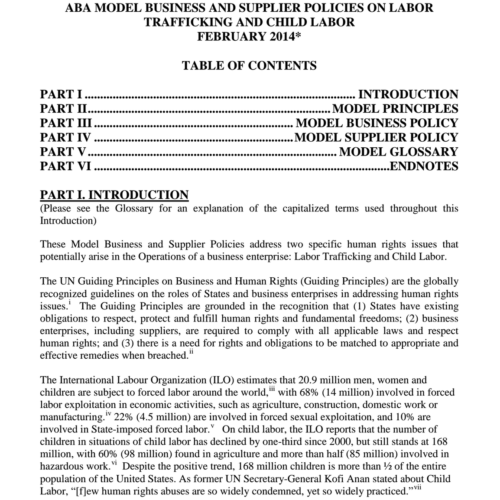 These model principles are intended for both businesses and suppliers that do not currently have policies relating to labour trafficking and child labour, and for those that do but want to adapt them to reflect evolving practices. Included are examples of model policies and principles that can be incoporated into codes of conduct or current business policies.
These model principles are intended for both businesses and suppliers that do not currently have policies relating to labour trafficking and child labour, and for those that do but want to adapt them to reflect evolving practices. Included are examples of model policies and principles that can be incoporated into codes of conduct or current business policies.Credit: American Bar Association
-
 Stronger Together is a multi-stakeholder initiative which aims to reduce modern slavery. It provides guidance, training and resources to organisations, employers, labour providers, workers and their representatives. This free collection of resources includes pragmatic guidance and toolkits, and resources for the workplace including multilingual posters, leaflets and template policies. These seven principles have been agreed upon by the supermarket businesses sponsored by Stronger Together. The list includes "common principles" for the businesses' supply chains partners to follow when completing modern slavery statements.
Stronger Together is a multi-stakeholder initiative which aims to reduce modern slavery. It provides guidance, training and resources to organisations, employers, labour providers, workers and their representatives. This free collection of resources includes pragmatic guidance and toolkits, and resources for the workplace including multilingual posters, leaflets and template policies. These seven principles have been agreed upon by the supermarket businesses sponsored by Stronger Together. The list includes "common principles" for the businesses' supply chains partners to follow when completing modern slavery statements.Credit: Stronger Together
-
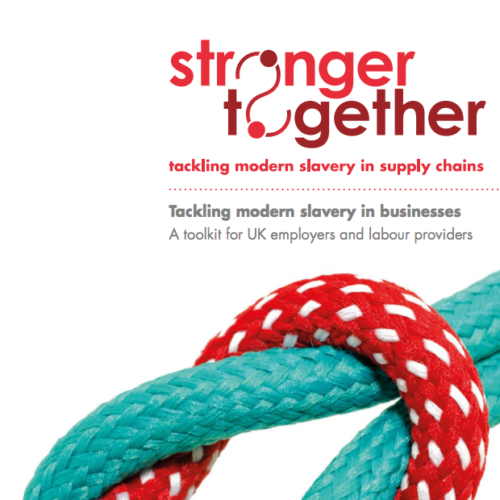 Stronger Together is a multi-stakeholder initiative which aims to reduce modern slavery. It provides guidance, training and resources to organisations, employers, labour providers, workers and their representatives. This free collection of resources includes pragmatic guidance and toolkits, and resources for the workplace including multilingual posters, leaflets and template policies. This template is to be modified as required and for inclusion with a wider Tackling Modern Slavery in Business and Supply Chain or Business Human Rights Policy.
Stronger Together is a multi-stakeholder initiative which aims to reduce modern slavery. It provides guidance, training and resources to organisations, employers, labour providers, workers and their representatives. This free collection of resources includes pragmatic guidance and toolkits, and resources for the workplace including multilingual posters, leaflets and template policies. This template is to be modified as required and for inclusion with a wider Tackling Modern Slavery in Business and Supply Chain or Business Human Rights Policy.Credit: Stronger Together
-
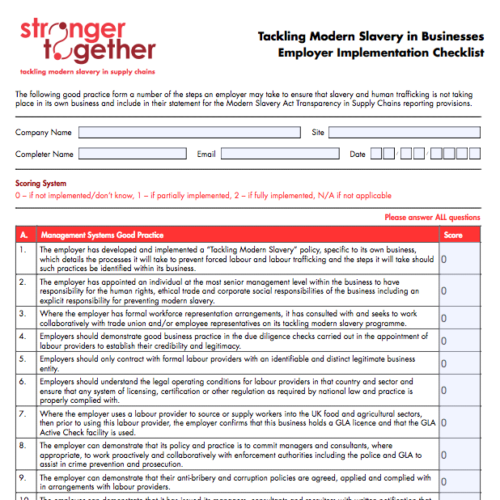 Stronger Together is a multi-stakeholder initiative which aims to reduce modern slavery. It provides guidance, training and resources to organisations, employers, labour providers, workers and their representatives. This free collection of resources includes pragmatic guidance and toolkits, and resources for the workplace including multilingual posters, leaflets and template policies. This is a good practice checklist that can be used by employers to ensure modern slavery and human trafficking is not happening in any area of their own business, and to include in their statement for the Modern Slavery Act Transparency in Supply Chains reporting provisions. It splits up the checklist into: management systems , training to build capacity and capability, labour sourcing, recruitment processes, worker records analysis to alert risks, workplace monitoring, worker engagement, providing access to remedy.
Stronger Together is a multi-stakeholder initiative which aims to reduce modern slavery. It provides guidance, training and resources to organisations, employers, labour providers, workers and their representatives. This free collection of resources includes pragmatic guidance and toolkits, and resources for the workplace including multilingual posters, leaflets and template policies. This is a good practice checklist that can be used by employers to ensure modern slavery and human trafficking is not happening in any area of their own business, and to include in their statement for the Modern Slavery Act Transparency in Supply Chains reporting provisions. It splits up the checklist into: management systems , training to build capacity and capability, labour sourcing, recruitment processes, worker records analysis to alert risks, workplace monitoring, worker engagement, providing access to remedy.Credit: Stronger Together
-
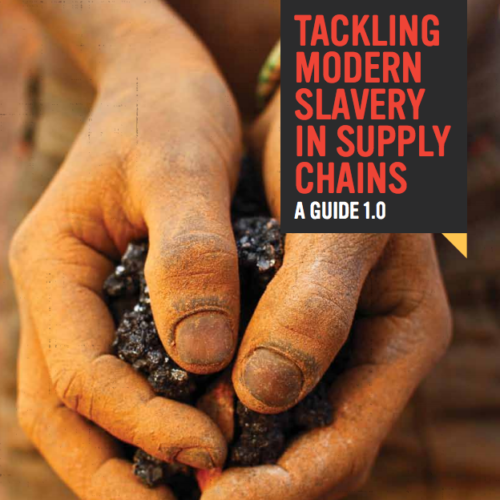 The Walk Free Foundation was established by Andrew Forrest, the Chairman of Fortescue Metals Group, after he found labour exploitation within his own supply chains and took a number of steps to prevent modern slavery affecting his business. This comprehensive guide considers corporate policy on modern slavery and provides both guidance and tools to implement it. It includes advice on corporate policy and provides template examples of a number of tools.
The Walk Free Foundation was established by Andrew Forrest, the Chairman of Fortescue Metals Group, after he found labour exploitation within his own supply chains and took a number of steps to prevent modern slavery affecting his business. This comprehensive guide considers corporate policy on modern slavery and provides both guidance and tools to implement it. It includes advice on corporate policy and provides template examples of a number of tools.Credit: Walk Free Foundation and Verite
-
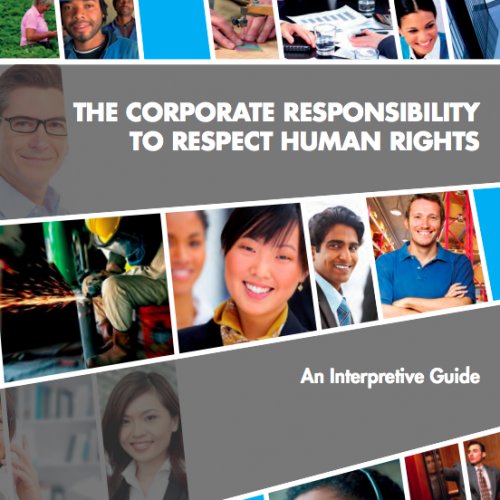 This publication is the official guidance accompanying the UN Guiding Principles on Business and Human Rights; it is designed to support effective implementation.
This publication is the official guidance accompanying the UN Guiding Principles on Business and Human Rights; it is designed to support effective implementation.Credit: OHCHR
-
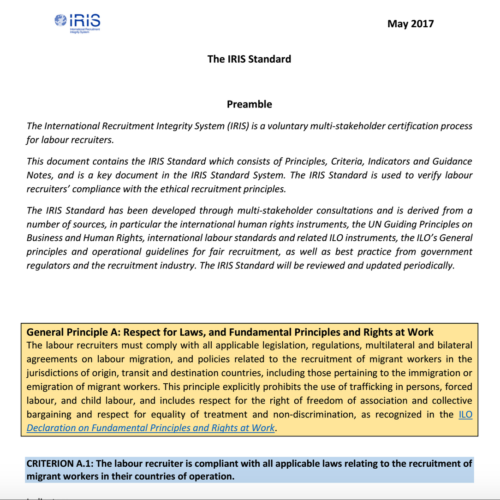 The International Recruitment Integrity System is a voluntary, multi-stakeholder certification system seeking to implement ethical recruitment standards. The Code of Conduct was established by IRIS as part of these efforts. There are 2 General Principles: Respect for Laws, and Fundamental Principles and Rights at Work Respect for Ethical and Professional Conduct It includes 5 Principles:
The International Recruitment Integrity System is a voluntary, multi-stakeholder certification system seeking to implement ethical recruitment standards. The Code of Conduct was established by IRIS as part of these efforts. There are 2 General Principles: Respect for Laws, and Fundamental Principles and Rights at Work Respect for Ethical and Professional Conduct It includes 5 Principles:- prohibition of recruitment fees to jobseekers
- respect for freedom of movement
- respect for transparency of terms and conditions of employment
- respect for confidentiality and data protection
- respect for access to remedy
Credit: International Recruitment Integrity System (IRIS)
-
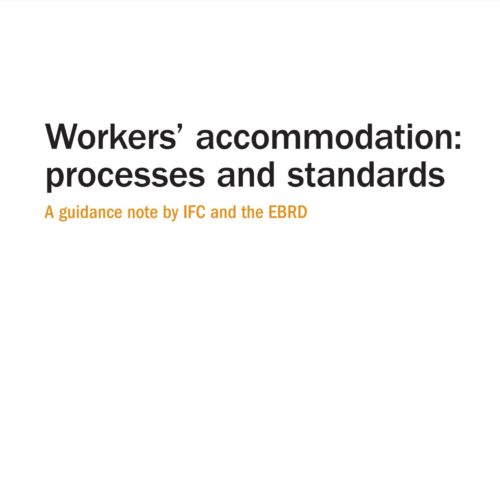 This Guidance Note is written by the EBRD, an international financial institution, and the IFC, a member of the World Bank Group, which creates opportunity for people to escape poverty and improve their lives. It is aimed at providing practical guidance to IFC and EBRD specialists, consultants and clients on the processes and standards that should be applied to the provision of workers’ accommodation in relation to projects funded by IFC or the EBRD. The Guidance Note also provides examples of good practice approaches that businesses have successfully applied in their operations.
This Guidance Note is written by the EBRD, an international financial institution, and the IFC, a member of the World Bank Group, which creates opportunity for people to escape poverty and improve their lives. It is aimed at providing practical guidance to IFC and EBRD specialists, consultants and clients on the processes and standards that should be applied to the provision of workers’ accommodation in relation to projects funded by IFC or the EBRD. The Guidance Note also provides examples of good practice approaches that businesses have successfully applied in their operations.Credit: International Finance Corporation & the European Bank for Reconstruction and Development

